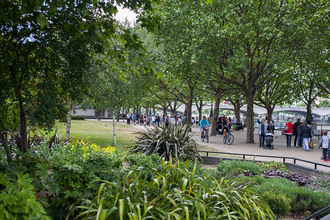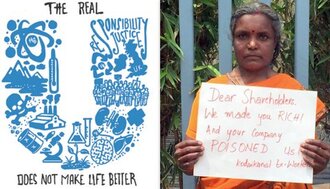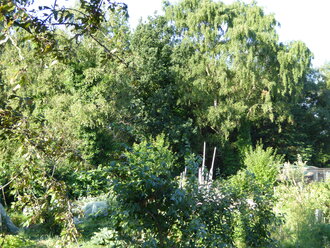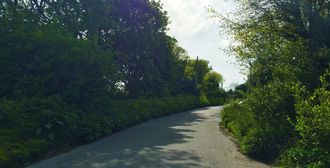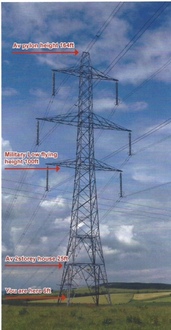-
SAVE HAMPSTEAD HEATHThe objectives of the petition are: 1. Save the Vale of Health and other harmless, ornamental ponds from further unwarranted work, damage and disruption. 2. Hold to account those who, knowingly or not, misled the ten councillors into wrongly believing they were receiving independent advise at the Camden hearing: namely Camden Planning and AECOM. 3. Ensure that an iron-clad version of the 1871 Hampstead Heath Act be passed through parliament so that nothing of this sort can ever happen again. It appears Atkins/AECOM/Bam Nutall have now commenced works on the Vale of Health. Realistically this means only 2 of our 3 objectives are 100% achievable. But we will continue to fight so that those responsible are held to account and this manner of financial exploitation of Hampstead Heath can never happen again. We ask all supporters to continue to promote and sign this petition, which will be read out and submitted at a press conference on the 20th of September 2015. Over 160 trees have been felled and large swathes of protected Heathland destroyed. It's a 4000,000/1 chance but we might still be able to save some of the historic ponds and surrounding natural habitat. Having been misled into believing they were receiving independent expert advice, 6 of the 10 elected councillors at a Camden Council hearing granted permission for large dams and various grass spills to be built on and around the ponds of Hampstead Heath. It turns out the council's supposedly independent advisor, AECOM, had already formed a strategic partnership with Atkins, the civil engineers building the dams and was therefore not independent. AECOM and Camden Council need to be held to account for misleading a council hearing and negligence, respectively. Moreover, the Vale of Health pond and other ornamental ponds could still be saved unnecessary damage and 'parkification' if the Secretary of State for the Environment, Liza Truss, steps in and prevents this scandalous pillage of the Heath. Please sign this petition to halt or, at least, downscale the works on Hampstead Heath. If one pond can be spared, one tree saved, it will mean some justice for Hampstead Heath.6,300 of 7,000 SignaturesCreated by Sebastian Wocker

-
Save Brimhay's Woodland Home to Endangered Bats and DormiceThese are highly endangered species and are protected by laws. This wooded valley is a beautiful area and highly valued my hundreds of people in Dartington. It needs protection, not destroying. An alternative community led proposal for housing is available, so destroying the wooded habitat is only for greed not need.391 of 400 SignaturesCreated by Alan White
-
Save our open public spaces - Lambeth CouncilLambeth Council has given notice to dispose of public open space given to them by the Greater London Council in the 1980s. This land has been leased to Coin Street Community Builders (CSCB) with the specific condition that it will remain free public open space for everybody to enjoy without long term commercial development. However the Garden Bridge Trust (GBT) needs this land in order to build a commercial building and CSCB wish to change the terms of their lease to allow this to happen. This completely goes against the core principles of community values fought for - by CSCB. We must not let our open public GREEN space be taken over by private developers. The Thames is London's largest area of central open space, its largest nature conservation area, and its greatest natural feature. Its openness is under threat as there are plans to put a Garden Bridge in the busiest tourist part of London, from Temple Tube Station to the South Bank, at a cost of £175 million. At least £60 million of this will be public money which is utterly iniquitous in these times of great austerity!435 of 500 SignaturesCreated by Hannah Quigley
-
Unilever - clean up your mess!Unilever exposed their workers and thousand other to harmful mercury pollution at their Kodaikanal thermometer assembly plant in India. The factory operators did not give its workers any protective equipment or information about the disastrous impact that mercury has on health. The factory owned by Hindustan Unilever also dumped toxic mercury around their plant, and this has not been cleaned up in the 14 years since this plant was shut down. The contamination continues to impact forests and groundwater. The workers cannot afford private healthcare. They have been fighting for Unilever to clean up the toxic contamination and compensate them for their medical expenses as a result of mercury for many long years. They need us to stand with them now, more than ever. Paul Polman, Unilever’s CEO, prides himself in heading a company that he says is accountable to its workers, and to the environment. Let’s ask him to put his words into practice by asking him to clean up his company’s toxic mess and to compensate the workers who have lost their health and in some cases, their children, to Unilever’s unethical practices. As the global CEO, he has the power and resources to either take unilateral action or pressure Hindustan Unilever – a Unilever subsidy – to take immediate action itself. Sign the petition.245 of 300 SignaturesCreated by Rachita Taneja
-
Ban weed killer Glyphosate sprayed on wheat just before it is harvestedNow that the World Health Organization has publicly condemned glyphosate herbicide as "probably carcinogenic to humans," awareness of this insidious chemical's contamination of the human food supply is suddenly exploding among health-conscious consumers. Most people, however, have no awareness at all that commercial wheat products are saturated with glyphosate before harvest. They think glyphosate is only used on genetically modified crops like corn and soybeans. But it turns out that glyphosate is routinely used as a wheat crop drying chemical to speed up harvesting. (Monitor breaking news headlines on glyphosate in real time at Glyphosate.news, part of the new FETCH.news network.) The very chemical that was designed to kill weeds, in other words, is so toxic to plant life that commercial farmers are using it to accelerate the death of wheat crops, thereby reducing the delay between cutting the crop and delivering it to market. The upshot is that the commercial wheat products you're buying in the store are saturated with deadly, cancer-causing glyphosate weed killer. And this is not just in the States its in the UK too!! And other countries. Learn more: http://www.naturalnews.com (NaturalNews) /050583_glyphosate_wheat_bread_crop_contamination.html#ixzz3hT3X3guK160 of 200 SignaturesCreated by Anne Walker
-
Save Woodside CopseWoodside Copse is a precious wildlife sanctuary. Untouched for 50 years, it is home to many species of birds and animals. It adds to the biodiversity of the area and forms part of a vital green corridor. Designated a Site of Importance for Nature Conservation, it is under threat following Haringey's decision on 6 July to allow the site to be developed. There is an alternative. The development could be put on the applicant's own site nearby, which would take up only a small portion of its site.627 of 800 SignaturesCreated by Isabel Popper
-
Ban the import of all Danish Goods.The Grind on the island of Vagur at Borg Beach is underway. On this same beach on June 10th 2015 they viciously slaughtered 110 whales and now they want to take between 100 and 200 more. It does not look like the whales can escape. The BRIGITTE BARDOT has been stopped by the Danish Navy.Two Sea Shepherd crew from the BARDOT have been arrested by the Danish Navy. All the courage and determination in the world cannot overcome the power of a Naval Frigate and an armed patrol ship. The police are on the beaches protecting the armed mob of whale killers from any acts of kindness that might occur. What is happening is a disgrace to humanity, to the Faroe Islands and to the nation of Denmark and every Danish citizen. It is a disgrace to Europe and is a blatant violation of European Union law. We call on the British Government to boycott all imports from Denmark and its protectorate countries until such time the people of the Faroe islands join us in the 21st Century.292 of 300 SignaturesCreated by Tim Beer
-
FREE PUBLIC TRANSPORT FOR UNDER 16's NATIONWIDEIn some areas, children's annual bus passes for September on wards are rising by a staggering 25%, for instance in Kent, a child's annual pass last year was at £200, this is now going to £250. Kent County Council also says it has to save £209 million over the next three years and so will increase the cost of its bus pass for 11 to 16-year-olds from £200 to £250 in September, a year after the price doubled from £100. The chairman of the Local Government Association’s Children and Young People’s Board, David Simmonds, told Schools Week that financial pressures were forcing many councils to scale back to meet their legal obligations “rather than go far beyond that – which is what they did historically”. For children under 8, councils are obliged to provide transport for pupils living more than two miles from the nearest suitable school. For those aged between 8 and 16, the statutory duty is to provide transport for those living more than three miles away. In rural areas, councils had traditionally provided free transport, although it was not a legal duty. It's now being eroded because of yet more cuts. This is going to affect so many people all over the country with Kent County Council being hit with the steepest rises with the best explanation being due to cuts needed in a council letting down not only the most vulnerable but the many people that are working so hard just to pay the bills and put food on the table that will have to not only find money for uniform and school essentials but also £250. The only legal obligation being kept nationwide is that to provide free travel for the over 65's Free school travel for children will have huge positives. - Attendance will be higher - Congestion and traffic will be minimised - Less road related accidents to children who walk near schools due to less traffic. Examples of how this is promoted in councils that RECOGNISE that free school buss pass's are the way forward; LONDON Children under the age of 11 only need a 5-10 Zip Oyster photocard to travel free on Tube, DLR, London Overground, TfL Rail and some National Rail services if they: Travel without an adult Look older than 10 A 5-10 Zip Oyster photocard isn't needed for your child to travel free on buses and trams or to buy child-rate paper tickets. If you think your child doesn't need a 5-10 Zip Oyster photocard, find out more about travelling with children. Children aged over 10 years and 11 months and under 16 on 31 August can get an 11-15 Zip Oyster photocard to travel free on buses and trams, and child rate on Tube, DLR, London Overground, TfL Rail and most National Rail services in London. CITY OF BRADFORD "Where walking/cycling is not possible, please consider public transport before using the family car on the school run, public transport is miles better for the environment and cuts down on traffic and pollution. Many secondary school pupils travel to school by public transport and the journey to a new school is often the first step your child will take toward independent travel; Bus services provide a safe and reliable way to get to school. Instead of giving your child a lift all the way to school why not consider dropping off at a bus stop or train station so that your child can continue their journey by public transport with friends?" All pupils in full time education are entitled to purchase a weekly School Plus Metro Card or for those occasional bus users pay half fare on public transport; please contact Metro for more information. Bus services run to or close by many local secondary and primary schools. To find out which buses serve your school and get up to date information on school travel please visit the Generation M website. Bradford Council is committed to reducing car travel which is a major source of pollution and congestion around school gates and encourages schools to produce a School Travel Plan setting out their commitment to sustainable school travel. Please ask your headteacher for more information on your School's Travel Plan Your child needs you to show them the way to sustainability. Reduce your car use and improve their quality of life. PLEASE SIGN AND SHARE ~ Together We Can Make A Difference ~532 of 600 SignaturesCreated by Kerry Keating

-
Stop the UK government killing off the UK solar industryThe Dept for Energy and Climate Change has just unveiled sweeping plans to slash subsidies to solar power. They are proposing measures that include cutting aid to small-scale solar power installations, and ending subsidies for roof-top panels earlier than expected. Solar and wind energy installations of less than 5MW are supported by feed-in tariffs - schemes that pay producers a subsidy for the electricity they generate, plus a bonus for any electricity exported back to the national grid. Under the new proposals, the amount to be paid from next year will fall to 1.63p per kilowatt hour from a current level of 12.92p for a new residential solar system. This is a hugely short sighted move by the government and is devastating for Britain's solar sector which employs over 35,000 people. The Secretary of State herself has stated that the total cost this year of the solar RO was just £3 per household on energy bills. Ending support for solar power makes no sense at all. The energy market currently has a wide range of subsidies and tax allowances in place, across all the technologies – renewables, nuclear and gas - and not all of these are transparent when it comes to the consumer. They have made these announcements after the House of Commons has risen for the summer recess so proper scrutiny in Parliament will now not be possible until after the consultation deadline. The Welsh government is already concerned, a spokesperson said the plans have the "potential to put jobs and investment under threat by reducing subsidies to projects already in the pipeline". The government is deliberately over-exaggerating the impact of renewable energy on bills and the timing of this move on solar power could not be worse as it is nearly subsidy free. Greenpeace pointed out that the government's maximum additional spend on green technologies by 2018 would be approximately half of what it spends subsidising the coal industry. Other groups called the changes "absurd". "Of course the feed-in tariff should fall as solar becomes cheaper, but the government clearly plans to remove support entirely," said Alasdair Cameron from Friends of the Earth. "This is politically motivated, and will take away power from people and hand it back to big energy firms." “Cutting the subsidies now will see businesses go bust and investment dry up. Jobs will go and emissions will stay higher at a time when policies and funding should be in place to ensure quite the opposite,” said Daisy Sands, head of the energy campaign at Greenpeace. Ray Noble, owner, Solar BIPV Ltd and Solar Power Portal outstanding achievement award winner has commented: "The decision to stop supporting the fastest deploying energy generation technology seems like madness to me. Especially when you consider that we are short of electricity, that solar has the biggest support of the the population; yet at the same time still giving 2 ROCs to other technologies that are creating the largest drain on the budget. Seems like winners are not liked and losers are preferred! “Combined with the cuts to wind subsidies, it looks like the government is gearing up for a full frontal attack on the renewable energy sector in the autumn while still handing out billion-pound tax breaks for oil and gas industry … It’s no good David Cameron saying how important the climate talks in Paris are, if the chancellor simultaneously weakens any shred of credibility of a claim to the UK’s low carbon leadership.” Please sign the petition now to help save jobs in the UK and support our commitment tackling climate change.32,199 of 35,000 SignaturesCreated by R V
-
Save the trees on Laity Lane, Carbis Bay, CornwallA temporary TPO was made on the 22 February 2015, and is only active for 6 months. After which time, the order is lifted or made permanent. One of the key elements in making this TPO permanent, is the support of not only local residents but visitors as well. The planned destruction of this beautiful stretch of trees and hedgerows is wrong because: - they act as a haven to local wildlife and flora. - they provide a significant contribution to the environmental quality and character of the area. - they enhance the enjoyment of both local residents & visitors alike. - their removal would have a significant, detrimental impact on the local environment and its enjoyment by the public. - Carbis Bay and the wider area of West Cornwall has scant tree cover as it is. Finally, perhaps most importantly, the trees and the hedgerows should be protected for their own sake202 of 300 SignaturesCreated by RAIID. COM
-
Ban weed killer Glyphosate sprayed on wheat just before it is harvestedThree months ago, the World Health Organisation’s International Agency for Research on Cancer (IARC), concluded ‘Glyphosate is probably carcinogenic to humans’. The newly recognised dangers of Glyphosate come against a background of increased use in the UK – not just in farming but also in public parks and other urban areas to kill weeds. On 15 July, new figures analysed by the Soil Association were released at a scientific briefing in London showing Glyphosate use in UK farming has increased by 400% in the last 20 years and it’s one of the three pesticides regularly found in routine testing of British bread - appearing in up to 30% of samples tested by the Defra committee on Pesticide Residues in Food (PRiF). The Soil Association is now calling for a UK ban on the use of Glyphosate sprayed on UK wheat as a pre-harvest weedkiller and its use to kill the crop to ripen it faster. The scientific panel included Professor Christopher Portier, one of the co-authors of the World Health Organisation’s International Agency for Research on Cancer’s (IARC) recent report which determined Glyphosate’s status as a probable carcinogen, who reiterated the IARC’s conclusions, and said: “Glyphosate is definitely genotoxic. There is no doubt in my mind.” We also heard from Dr Robin Mesnage of the Department of Medical and Molecular Genetics at Kings College in London, who revealed new data analysis showing Round Up, the most common brand of Glyphosate based herbicides, is 1,000 times more toxic than Glyphosate alone due to the inlusion of other toxic chemicals in its mix. Finally, Claire Robinson, an editor at GMWatch.org gave the international perspective looking at moves by other counrtries to ban Glyphosate; “Outside the United Kingdom, the reaction to the WHO IARC report has been dramatic. Some retailers in Switzerland and Germany have removed Glyphosate products and France has committed to do so by 2018 and German states are calling for an EU wide ban. The Danish Working Environment Authority has declared it as a carcinogen and El Salvador and Sri Lanka have banned it and the Colombia government has banned aerial spraying on coca crops.” Peter Melchett, Soil Association policy director said; “If Glyphosate ends up in bread it’s impossible for people to avoid it, unless they are eating organic. On the other hand, farmers could easily choose not to use Glyphosate as a spray on wheat crops – just before they are harvested. This is why the Soil Association is calling for the immediate ending of the use of Glyphosate sprays on wheat destined for use in bread. “We heard today that we shouldn’t rely on regulators to protect our health, the battle will be won by consumers ensuring retailers and bread manufacturers insist their products don’t contain any Glyphosate. Although the quantities found are below the official safety level, that limit was agreed before the latest scientific findings about the dangers of Glyphosate. The Glyphosate spraying season starts now, and in the interests of human health and the quality of British bread, the government needs to call a halt to the spraying before it starts.”906 of 1,000 SignaturesCreated by Anne Walker
-
Stop the Dumfries & Galloway Pylons- The proposed pylons will be massively visually intrusive in what is one of the few beautiful, unspoiled parts of the UK left. - They will harm the environment and local wildlife. - They will be hugely damaging to the tourist sector in Dumfries and Galloway, a key driver of the local economy. - The pylon line will seriously affect house values and the ability to sell houses for miles around due to its size and visual impact. - Other alternatives, such as putting the line underground or under the sea, are available and could be adopted.2,330 of 3,000 SignaturesCreated by David Howdle
Hello! We use cookies to improve your experience by providing insights into how the site is being used. Find out more.


